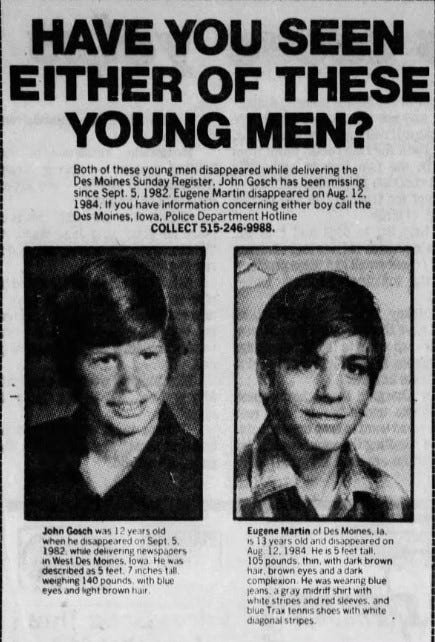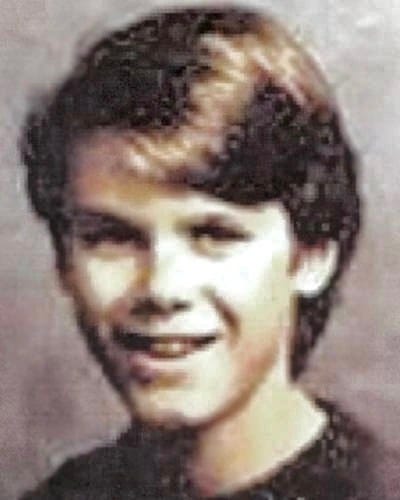Eugene Martin: 1984 Disappearance of Iowa Paperboy Still Unsolved
They found his bag of newspapers on the ground, but he was gone
Paperboy Vanishes
On the morning of August 12th, 1984, 13-year-old Eugene Martin left his home to begin delivering papers. It started off like a normal day; Eugene arrived to pick up The Des Moines Register newspapers, then sat down to fold them and place them in his bag.
However, he would never deliver these papers. His bag, still full, would be discovered later that morning, but the boy himself was gone.
Eyewitness sightings would indicate that he’d been talking to a man shortly before he vanished, but the identity of this individual has never been determined.
Furthermore, Eugene wasn’t the only boy to vanish under mysterious circumstances in Des Moines.
12-year-old Johnny Gosch went missing in 1982 and 13-year-old Marc Allen would disappear in 1986. And, like Eugene, they’ve never been found.
The striking similarities between these cases would lead many to believe that there was a connection and that perhaps all three boys had been abducted by the same person (or persons). But solid evidence or viable leads remained elusive and Eugene’s case soon went cold.
What happened to Eugene Martin?
Eugene Wade Martin
Eugene Wade Martin was born on August 17th, 1970, in Des Moines, Iowa, to parents Janice and Donald. Eugene was a quiet, kind and shy boy who enjoyed skateboarding, fishing, video games and cartoons.
He’d been working as a paperboy for The Des Moines Register for a few months and was saving up money to spend at the upcoming Iowa State Fair. He was a responsible and reliable worker, who never failed to complete his newspaper deliveries.
Eugene’s Disappearance
On August 12th, 1984—just five days before his 14th birthday—Eugene got up early and went out to make his deliveries. He was usually accompanied on his paper route by his older brother, but he was staying over at a friend’s house that day, so Eugene went alone.
Multiple witnesses saw him arrive to pick up his papers at 5:15 a.m. It was also around this time that he was spotted talking to an unidentified man. No one knew exactly what the two were saying, but it appeared to be a friendly interaction. The stranger was described as a clean-shaven man in his 30s. Unfortunately, this description would prove too vague to be helpful.
Eugene was last seen around 5:30 a.m. He was folding newspapers and putting them in his bag. Nothing appeared to be out of the ordinary.
Then later that morning, around 7:15 a.m., a customer phoned his route manager and stated that she hadn’t received her paper. The route manager went in search of Eugene, but found only his full bag of newspapers sitting on the ground. He delivered the papers himself before calling the Martin family to notify them that Eugene was gone.
Donald Martin went out immediately to begin looking for his son. He searched the area in and around Eugene’s paper route, but didn’t see him anywhere. At 8:40 a.m. Donald called the police to report Eugene missing.
Search
Law enforcement initially considered Eugene a probable runaway, though he’d never done such a thing before. However, they began conducting a search anyway and also interviewed witnesses. They learned that a suspicious man (not the one Eugene had been speaking to) had been spotted in the area that morning. The person in question was driving a green car and had reportedly been following two girls.
The driver was said to be a white man, in his 20s or 30s, with dark hair. Investigators managed to track him down quickly. When they questioned him, he explained that he was only around to drop his wife off at work that morning. They confirmed this to be true and—due to a lack of evidence of any wrongdoing—ruled him out as a suspect in Eugene’s disappearance.
Conversely, the man seen engaging Eugene in conversation was never located.
Law enforcement came to believe that the missing paperboy had been abducted. They enlisted the help of the FBI in their investigation. An extensive search was carried out—on land and by helicopter—by police officers, friends, family, FBI agents, and volunteers. They combed parks, ditches, warehouses, and rural areas. Chariton River was dragged as well, but no clues were found.
“Everyone has their theories, but no cold, hard facts,” said Eugene’s mother Janice. “I guess you could say there is no trace. I wonder where he is at, what he is doing, whether he is asking for me and his dad.”
His family missed him dearly and continued to hope that he would be found safe. They wanted him home for his birthday and longed to give him the new bicycle they’d purchased for him.
But the investigation quickly hit a standstill.
“Tips? Virtually none,” said Des Moines Police Sergeant Bill Mullins. “It’s been a virtual void of information.”
Similar Cases
On September 5th, 1982, 12-year-old Johnny Gosch vanished while out delivering papers. Leading up to this, eyewitnesses noticed a couple of things as Johnny went about his morning. For one, a stranger in a blue car sought directions from him. Secondly, another man was reportedly seen following him on foot at one point.
Johnny, like Eugene, was usually accompanied by a family member (his father), but was on his own that day. His abandoned wagon of newspapers would be discovered around 8:30 a.m., with his dog Gretchen tied to it, but Johnny was gone. He worked for The Des Moines Register as well.
On March 29th, 1986, 13-year-old Marc Allen left his home to visit a friend who lived just down the street, but he never showed up.
The claim that Marc was also a paperboy was disputed by The Des Moines Register, who said that he didn’t work there. However, his brother later confirmed that he had been a paperboy. Either way, it is known that Marc wasn’t delivering newspapers at the time he went missing; he’d only intended to go to his friend’s house.
Noreen Gosch, who believes her son was abducted into a local child sex-trafficking ring, had reason to think Eugene fell victim to the same dark organization.
Months before Eugene Martin’s disappearance, Sam Soda, a private investigator, reportedly told Noreen that he’d learned another “kidnapping would take place the second weekend in August 1984.” This, of course, matches the time frame in which Eugene vanished.
However, it’s important to note that Soda himself was regarded as a person of interest in Johnny’s case and—if you believe he was involved—it’s not hard to guess how he might have known in advance that another boy would be kidnapped. That being said, Soda has never been charged in connection with either case.
Additionally, the local pedophile ring claims have never been verified, nor has any concrete evidence ever been discovered to link Eugene’s disappearance to one.
Yet, given the similar victim profiles of Eugene, Johnny, and Marc, as well as the fact that all three vanished in the same general area, it’s certainly plausible that they were targeted by the same perpetrator(s). No conclusive connection has ever been established, though.
Local Predators
In 1984, 37-year-old Frank Sykora, an employee at The Des Moines Register, was fired after being accused of molesting paperboys. He turned himself in and admitted to having “sexual contact” with at least seven young newspaper carriers.
He soon changed his story and pleaded not guilty to charges of lewd and lascivious acts with a child, and third-degree sexual abuse. However, the following year, he changed his plea to guilty.
Given the nature of his crimes, as well as his proximity to the missing boys, investigators wondered if he’d possibly had any involvement in the disappearances of Eugene Martin and Johnny Gosch. He was questioned in connection with these cases and given a polygraph test (which he passed), and was ultimately ruled out as a suspect.
It’s unclear, but it appears that the polygraph results were the main—if not only—reason they eliminated him as a suspect, but hopefully they had more than that to go on.
This brings us to yet another child predator who was employed by The Des Moines Register: Wilbur Millhouse. In 1986, 43-year-old Millhouse was arrested and charged with third-degree sexual abuse after two of his victims came forward.
Law enforcement conducted a search of Millhouse’s home and found something very troubling—a list of 2,200 names and phone numbers of boys who lived in the Des Moines area. Along with this information, Millhouse had made notes about many of the boys and even had yearbook photos of some of them.
Millhouse had worked as a circulation manager for The Des Moines Register until 1983 and part of his job entailed recruiting paperboys. He left his position after suffering a heart attack. He confessed to calling many local boys—while posing as someone else—and attempting to engage them in inappropriate discussions.
Investigators wrote letters to the parents of the boys on the list, to make them aware that their sons had possibly been targeted and abused by Millhouse. This resulted in more of his victims coming forward. He was sentenced to 30 years in prison after pleading guilty to charges of sexual abuse. He died in 2015.
Years later, a former paperboy—who chose to remain anonymous—would claim that Millhouse knew what happened to Johnny Gosch and had hinted at his own involvement.
“Nothing would have happened to Johnny if he would have kept his mouth shut,” he allegedly said.
Millhouse was reportedly in Kansas City when Johnny disappeared, though, and was never officially linked to the disappearances.
For his part, Donald Martin believed that his son, who was very shy, wouldn’t have gone anywhere with someone he didn’t know.
“It had to be somebody Gene could trust. He was not the type to walk up to someone.”
Were the presumed abductions of these boys the acts of a lone predator? Or perhaps more than one? That remains unknown.
Other Developments
There were reports of attempted kidnappings of several young newspaper carriers in the area from 1986-1989.
Eugene Martin’s case, which has gone cold, hasn’t had any recent developments.
The Martin family put a lot of money and resources into trying to find him. His loss had a profound impact on them.
“Eugene was the baby,” said Jeannie McDowell, Donald’s sister. “And when he left, it just killed my brother.”
Sadly, both of Eugene’s parents have since passed away.
“This case haunts me,” stated Detective James Rowley. “It’s the case I’ll take to the grave.”
The disappearance of Eugene Martin remains unsolved.
If you have any information regarding Eugene Martin’s disappearance, you are encouraged to contact the Des Moines Police Department at (515) 283-4811.
If you would like to support my work and make a donation: Buy Me a Coffee








😊 you for uploading this article; your continued excellent work is appreciated.